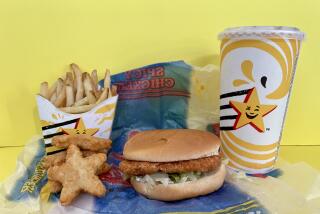Sales of Low-Fat Items Fall on Lean Times
- Share via
McDonald’s McLean Deluxe hamburger is about to become McHistory.
The giant restaurant chain said Monday that it is phasing out its unpopular reduced-fat burger, underscoring an industry trend toward heavier fast-food fare.
Introduced as a nutritious alternative, the McLean Deluxe was made with a seaweed derivative and had a different taste than that of all-beef burgers. The McLean was lauded by nutritionists but not consumers, who preferred the taste of regular hamburgers. Merrill Lynch restaurant industry analyst Peter Oakes said the McLean Deluxe accounted for less than 1% of McDonald’s sales.
“Certain franchisees told me that even if they were doing headstands and spitting wooden nickels, they couldn’t sell this product,” Oakes said.
Sales were so poor, in fact, that some restaurants resorted to making an occasional McLean Deluxe with regular, higher-fat beef, according to an investigation by ABC’s “PrimeTime Live.” McDonald’s condemned the practice.
Fast-food customers have shown a preference for fattier foods. Pizza Hut’s stuffed-crust pizza has become a $1-billion menu item in the last year. The PepsiCo unit tried to sell a low-fat pizza, but it flopped.
Taco Bell, also a unit of PepsiCo, is introducing Mexican food items with bacon and is considering the addition of French fries to its menu. The company introduced reduced-fat items a year ago, but they failed to boost sales.
Recently, Wendy’s unabashedly called attention to its larger hamburgers in a series of television commercials showing stout male actors at meetings of its fictitious “Big Eaters Club.”
Even as it withdraws the McLean, McDonald’s is testing a new burger called the Arch Deluxe, which analysts say is an extra large burger with bacon.
“The popular notion of food eaten away from home being diet-conscious fare is a lot more smoke than fire,” said Bob Wisely, senior vice president of marketing for the Anaheim-based Carl’s Jr. fast-food chain. Carl’s Jr. offers low-calorie alternatives, but, as Wisely notes, baked potatoes typically leave the kitchen covered with sour cream, cheese and bacon.
“People are going to eat what tastes good as opposed to what is healthy,” said Steven A. Rockwell, a fast-food industry analyst with Alex. Brown & Sons in Baltimore. “When you go into a fast-food restaurant, the expectation is that you are going to eat a less healthy meal.”
Besides the McLean Deluxe, McDonald’s is dropping its slow-selling chef’s salad and garden salad. The company said it will continue to offer some lighter selections, such as its McGrilled Chicken Classic, which has 4 grams of fat.
McDonald’s stood by the McLean Deluxe for several years despite weak sales and low enthusiasm among franchisees. It was launched in 1991 amid complaints from nutrition activists about the fat content of fast food. The McLean Deluxe contains 10 grams of fat, compared with McDonald’s Quarter Pounder hamburger, which contains 21 grams.
Analysts estimated that McDonald’s spent between $25 million and $50 million to launch the McLean Deluxe.
“This was clearly the most healthful hamburger, and it is unfortunate it didn’t sell very well,” said Michael Jacobson, director of the Center for Science in the Public Interest, a Washington advocacy group.
He said sales may have suffered because McLean Deluxe sandwiches were cooked to order, meaning patrons had to wait.
“Not many people who go to a fast-food restaurant want to wait five minutes,” Jacobson said.
Staff writer Greg Johnson in Orange County contributed to this report.
More to Read
Eat your way across L.A.
Get our weekly Tasting Notes newsletter for reviews, news and more.
You may occasionally receive promotional content from the Los Angeles Times.









